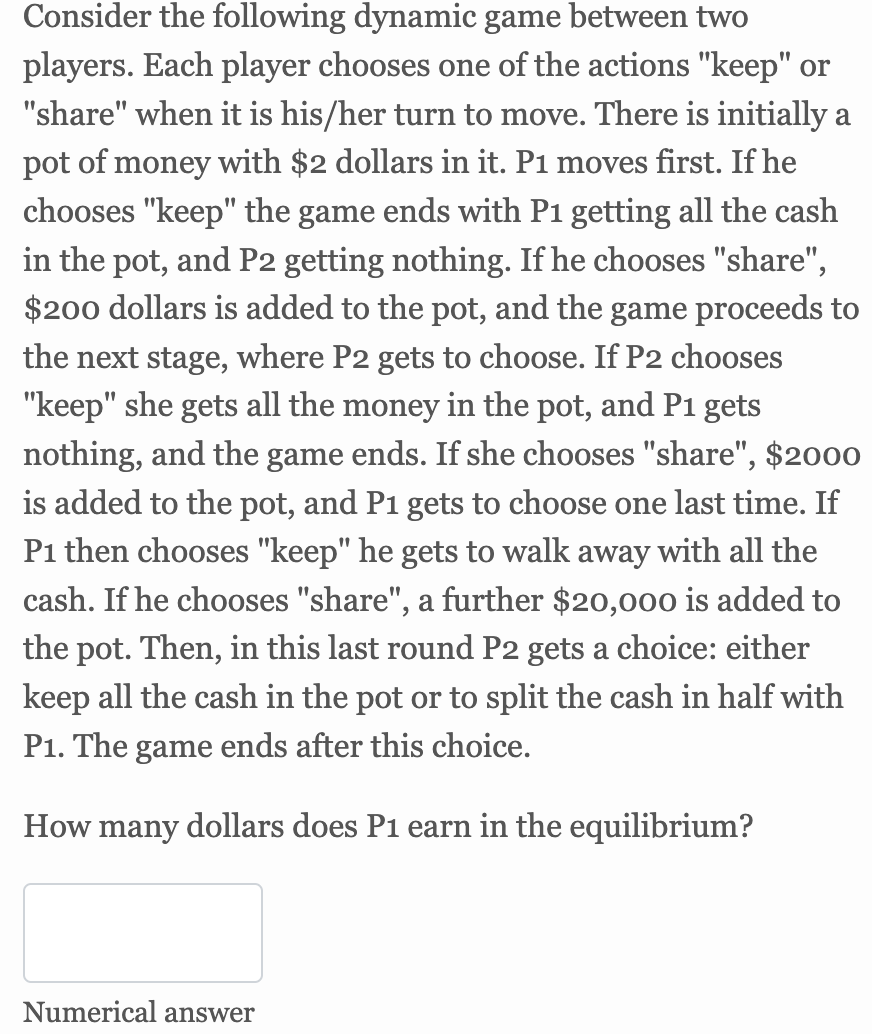Consider the following dynamic game between two players. Each player chooses one of the actions "keep" or "share" when it is his/her turn to move. There is initially a pot of money with $2 dollars in it. P1 moves first. If he chooses "keep" the game ends with P1 getting all the cash in the pot, and P2 getting nothing. If he chooses "share", $200 dollars is added to the pot, and the game proceeds to the next stage, where P2 gets to choose. If P2 chooses "keep" she gets all the money in the pot, and P1 gets nothing, and the game ends. If she chooses "share", $2000 is added to the pot, and P1 gets to choose one last time. If P1 then chooses "keep" he gets to walk away with all the cash. If he chooses "share", a further $20,000 is added to the pot. Then, in this last round P2 gets a choice: either keep all the cash in the pot or to split the cash in half with P1. The game ends after this choice. How many dollars does P1 earn in the equilibrium?
Consider the following dynamic game between two players. Each player chooses one of the actions "keep" or "share" when it is his/her turn to move. There is initially a pot of money with $2 dollars in it. P1 moves first. If he chooses "keep" the game ends with P1 getting all the cash in the pot, and P2 getting nothing. If he chooses "share", $200 dollars is added to the pot, and the game proceeds to the next stage, where P2 gets to choose. If P2 chooses "keep" she gets all the money in the pot, and P1 gets nothing, and the game ends. If she chooses "share", $2000 is added to the pot, and P1 gets to choose one last time. If P1 then chooses "keep" he gets to walk away with all the cash. If he chooses "share", a further $20,000 is added to the pot. Then, in this last round P2 gets a choice: either keep all the cash in the pot or to split the cash in half with P1. The game ends after this choice. How many dollars does P1 earn in the equilibrium?
Managerial Economics: A Problem Solving Approach
5th Edition
ISBN:9781337106665
Author:Luke M. Froeb, Brian T. McCann, Michael R. Ward, Mike Shor
Publisher:Luke M. Froeb, Brian T. McCann, Michael R. Ward, Mike Shor
Chapter15: Strategic Games
Section: Chapter Questions
Problem 3MC
Related questions
Question
1

Transcribed Image Text:Consider the following dynamic game between two
players. Each player chooses one of the actions "keep" or
"share" when it is his/her turn to move. There is initially a
pot of money with $2 dollars in it. P1 moves first. If he
chooses "keep" the game ends with P1 getting all the cash
in the pot, and P2 getting nothing. If he chooses "share",
$200 dollars is added to the pot, and the game proceeds to
the next stage, where P2 gets to choose. If P2 chooses
"keep" she gets all the money in the pot, and P1 gets
nothing, and the game ends. If she chooses "share", $2000
is added to the pot, and P1 gets to choose one last time. If
P1 then chooses "keep" he gets to walk away with all the
cash. If he chooses "share", a further $20,000 is added to
the pot. Then, in this last round P2 gets a choice: either
keep all the cash in the pot or to split the cash in half with
P1. The game ends after this choice.
How many dollars does P1 earn in the equilibrium?
Numerical answer
Expert Solution
This question has been solved!
Explore an expertly crafted, step-by-step solution for a thorough understanding of key concepts.
This is a popular solution!
Trending now
This is a popular solution!
Step by step
Solved in 2 steps with 4 images

Knowledge Booster
Learn more about
Need a deep-dive on the concept behind this application? Look no further. Learn more about this topic, economics and related others by exploring similar questions and additional content below.Recommended textbooks for you

Managerial Economics: A Problem Solving Approach
Economics
ISBN:
9781337106665
Author:
Luke M. Froeb, Brian T. McCann, Michael R. Ward, Mike Shor
Publisher:
Cengage Learning


Managerial Economics: Applications, Strategies an…
Economics
ISBN:
9781305506381
Author:
James R. McGuigan, R. Charles Moyer, Frederick H.deB. Harris
Publisher:
Cengage Learning

Managerial Economics: A Problem Solving Approach
Economics
ISBN:
9781337106665
Author:
Luke M. Froeb, Brian T. McCann, Michael R. Ward, Mike Shor
Publisher:
Cengage Learning


Managerial Economics: Applications, Strategies an…
Economics
ISBN:
9781305506381
Author:
James R. McGuigan, R. Charles Moyer, Frederick H.deB. Harris
Publisher:
Cengage Learning

Exploring Economics
Economics
ISBN:
9781544336329
Author:
Robert L. Sexton
Publisher:
SAGE Publications, Inc

Microeconomics: Principles & Policy
Economics
ISBN:
9781337794992
Author:
William J. Baumol, Alan S. Blinder, John L. Solow
Publisher:
Cengage Learning